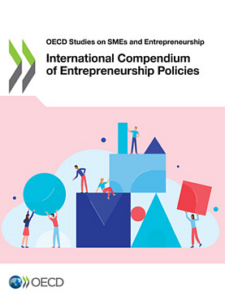Reflection on OECD’s International Compendium of Entrepreneurship Policies Report
The challenges we face are enormous, however, as is our capacity for change and growth. This current moment is an opportunity for real institutional change, but only if we face these challenges together.
This past Monday, we joined forces with the OECD to discuss how the entrepreneurial community grapples with the ongoing uncertainties caused by the pandemic. The webinar started with welcoming remarks from Céline Kauffman, Head of SME and Entrepreneurship policy Division, OECD, and Ayman El Tarabishy, President and CEO, of ICSB.
The global response to these issues will dictate the business ecosystem’s structure for decades, as mentioned by Professor Colin Mason, University of Glasgow, UK, and OECD report contributor. We remain steadfast in our belief that empowering entrepreneurs is key to facilitating a successful response to this ongoing crisis. Today, it seemed important to look at an array of currently unfolding strategies and propose a few of our own.
Across the world, countries are continuing to propose bold and innovative solutions to the myriad of financial issues that have come in the wake of COVID-19. Torsten Anderson, Deputy Director General at the Danish Business Authority, talked about the Danish success in strengthening their entrepreneurship support network and transition to an ecosystem approach. Ana Costa Paula, Head of Unit, Business Policy, Ministry of Economy and Digital Transition – Portugal, talked about the Portuguese focus on technological infrastructure and the benefits of strong start-up markets. We are all aware of Australia’s success by directly transferring large amounts of aid to small businesses to bolster their resiliency and ability to adapt, as outlined by Vicki Stylianou, Head of advocacy and policy at Institute of Public Accountants. Institute, Australia, and an ICSB Board member.
Although these approaches are uniquely tailored to each country’s specific situation, they have one fundamental similarity: they rely on broad policy interventions to strengthen small businesses and entrepreneurs’ ability to respond effectively to the evolving business ecosystem. Governments worldwide are shaping powerful and efficient ecosystems bypassing sustainable policies that aim to grow their humane and productive entrepreneurship capacity. Mr. Andrew McDonald, Chair, Small Business Investment Committee, the European Bank for Reconstruction and Development (EBRD), stressed the importance of tailoring responses by stage of business and region.
 The OECD’s International Compendium of Entrepreneurship Policies covered in the webinar session presented superbly by Jonathan Potter, Head of Entrepreneurship Policy and Analysis Unit. The OECD has a multi-layered approach to these policy interventions. The first layer is policy intervention for institutional conditions or conditions that deal directly with the business or employees. This usually involves easing regulatory barriers and changing your employees’ or consumers’ attitudes or behaviors. Addressing regulatory barriers is crucial, especially throughout the uncertain context within which we currently find ourselves. Small businesses are faced with a capital shortage and need to address their capacity and flexibility. Freeing them from unnecessary regulatory burdens will provide a crucial boost during a volatile time. The second layer is the most important one. Financial resources must get into the hands of small businesses and entrepreneurs to take advantage of other policy interventions like removing regulatory barriers. Big businesses have been prioritized to stabilize the economy as it suffered its worst economic shock ever. However, as we enter a recovery period and build back, investing in small businesses is the best way to revitalize and repair the global economy. The third layer of the Compendium builds on this idea. By providing holistic regional and national policy initiatives directly to small businesses, we hope to foster a sustainable and automated small business ecosystem that will evolve alongside a changing world and provide innovative solutions to whatever problems may arise.
The OECD’s International Compendium of Entrepreneurship Policies covered in the webinar session presented superbly by Jonathan Potter, Head of Entrepreneurship Policy and Analysis Unit. The OECD has a multi-layered approach to these policy interventions. The first layer is policy intervention for institutional conditions or conditions that deal directly with the business or employees. This usually involves easing regulatory barriers and changing your employees’ or consumers’ attitudes or behaviors. Addressing regulatory barriers is crucial, especially throughout the uncertain context within which we currently find ourselves. Small businesses are faced with a capital shortage and need to address their capacity and flexibility. Freeing them from unnecessary regulatory burdens will provide a crucial boost during a volatile time. The second layer is the most important one. Financial resources must get into the hands of small businesses and entrepreneurs to take advantage of other policy interventions like removing regulatory barriers. Big businesses have been prioritized to stabilize the economy as it suffered its worst economic shock ever. However, as we enter a recovery period and build back, investing in small businesses is the best way to revitalize and repair the global economy. The third layer of the Compendium builds on this idea. By providing holistic regional and national policy initiatives directly to small businesses, we hope to foster a sustainable and automated small business ecosystem that will evolve alongside a changing world and provide innovative solutions to whatever problems may arise.
These recommendations by the International Compendium are directly aligned with our entrepreneurial growth values through Humane Entrepreneurship’s lens. At ICSB, we believe that sustainable, humane, or “productive” (as referred to by the OECD) entrepreneurship is the best way to respond to the challenges we face as a global community. We believe that empowering atypical and non-traditional actors is necessary to unlocking our full potential, and we recognize the importance of education and community in achieving these goals. These conferences and gathering spaces, digital or material, are a window into the future of a humane and prosperous business world. The challenges we face are enormous, however, as is our capacity for change and growth. This current moment is an opportunity for real institutional change, but only if we face these challenges together.
Learn more about the OECD’s work and their recently published International Compendium of Entrepreneurship Policies here.



